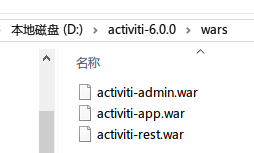activiti6安装包中

1/直接将三个war包放入tomcat中,即可运行,使用H2内存数据库
2/使用mysql数据库运行
2.1/activiti-admin
# security configuration (this key should be unique for your application, and kept secret) security.rememberme.key=activitis3cr3tk3y # H2 example (default) #datasource.driver=org.h2.Driver #datasource.url=jdbc:h2:tcp://localhost/activitiadmin # MySQL example datasource.driver=com.mysql.jdbc.Driver datasource.url=jdbc:mysql://127.0.0.1:3306/test-wf-admin?characterEncoding=UTF-8&useSSL=false #datasource.driver=org.postgresql.Driver #datasource.url=jdbc:postgresql://localhost:5432/activitiadmin #datasource.driver=com.microsoft.sqlserver.jdbc.SQLServerDriver #datasource.url=jdbc:sqlserver://localhost:1433;databaseName=activitiadmin #datasource.driver=oracle.jdbc.driver.OracleDriver #datasource.url=jdbc:oracle:thin:@localhost:1521:ACTIVITIADMIN #datasource.driver=com.ibm.db2.jcc.DB2Driver #datasource.url=jdbc:db2://localhost:50000/activitiadmin datasource.username=root datasource.password=root # JNDI CONFIG # If uncommented, the datasource will be looked up using the configured JNDI name. # This will have preference over any datasource configuration done below that doesn't use JNDI # # Eg for JBoss: java:jboss/datasources/activitiDS # #datasource.jndi.name=jdbc/activitiDS # Set whether the lookup occurs in a J2EE container, i.e. if the prefix "java:comp/env/" needs to be added if the JNDI # name doesn't already contain it. Default is "true". #datasource.jndi.resourceRef=true #hibernate.dialect=org.hibernate.dialect.H2Dialect #hibernate.dialect=org.hibernate.dialect.MySQLDialect #hibernate.dialect=org.hibernate.dialect.Oracle10gDialect #hibernate.dialect=org.hibernate.dialect.SQLServerDialect #hibernate.dialect=org.hibernate.dialect.DB2Dialect #hibernate.dialect=org.hibernate.dialect.PostgreSQLDialect #hibernate.show_sql=false #hibernate.generate_statistics=false # # Connection pool (see http://www.mchange.com/projects/c3p0/#configuration) # datasource.min-pool-size=2 datasource.max-pool-size=10 datasource.acquire-increment=2 # test query for H2, MySQL, PostgreSQL and Microsoft SQL Server #datasource.preferred-test-query=select 1 # test query for Oracle #datasource.preferred-test-query=SELECT 1 FROM DUAL # test query for DB2 #datasource.preferred-test-query=SELECT current date FROM sysibm.sysdummy1 #datasource.test-connection-on-checkin=true #datasource.test-connection-on-checkout=true #datasource.max-idle-time=1800 #datasource.max-idle-time-excess-connections=1800 # # Cluster settings # # This a period of time, expressed in milliseconds, that indicates # when a node is deemed to be inactive and is removed from the list # of nodes of a cluster (nor will it appear in the 'monitoring' section of the application). # # When a node is properly shut down, it will send out an event indicating # it is shut down. From that point on, the data will be kept in memory for the amount # of time indicated here. # When a node is not properly shut down (eg hardware failure), this is the period of time # before removal, since the time the last event is received. # # Make sure the value here is higher than the sending interval of the nodes, to avoid # that nodes incorrectly removed. # # By default 10 minutes cluster.monitoring.max.inactive.time=600000 # A cron expression that configures when the check for inactive nodes is made. # When executed, this will mark any node that hasn't been active for 'cluster.monitoring.max.inactive.time' # seconds, as an inactive node. Default: every 5 minutes. cluster.monitoring.inactive.check.cronexpression=0 0/5 * * * ? # REST endpoint config rest.app.name=Activiti app rest.app.description=Activiti app Rest config rest.app.host=http://localhost rest.app.port=8080 rest.app.contextroot=activiti-app rest.app.restroot=api rest.app.user=admin rest.app.password=test # Passwords for rest endpoints and master configs are stored encrypted in the database using AES/CBC/PKCS5PADDING # It needs a 128-bit initialization vector (http://en.wikipedia.org/wiki/Initialization_vector) # and a 128-bit secret key represented as 16 ascii characters below # # Do note that if these properties are changed after passwords have been saved, all existing passwords # will not be able to be decrypted and the password would need to be reset in the UI. security.encryption.credentialsIVSpec=j8kdO2hejA9lKmm6 security.encryption.credentialsSecretSpec=9FGl73ngxcOoJvmL # BPMN 2.0 Modeler config modeler.url=https://activiti.alfresco.com/activiti-app/api/ # Enable multi tenant support, disabled by default #multi-tenant.enabled=true
2.2 activiti-app
#
# SECURITY
#
security.rememberme.key=testkey
#
# DATABASE
#
#datasource.driver=org.h2.Driver
#datasource.url=jdbc:h2:mem:activiti;DB_CLOSE_DELAY=-1
datasource.driver=com.mysql.jdbc.Driver
datasource.url=jdbc:mysql://127.0.0.1:3306/test-wf-app?characterEncoding=UTF-8&useSSL=false
datasource.username=root
datasource.password=root
#hibernate.dialect=org.hibernate.dialect.H2Dialect
#hibernate.dialect=org.hibernate.dialect.MySQLDialect
#hibernate.dialect=org.hibernate.dialect.Oracle10gDialect
#hibernate.dialect=org.hibernate.dialect.SQLServerDialect
#hibernate.dialect=org.hibernate.dialect.DB2Dialect
#hibernate.dialect=org.hibernate.dialect.PostgreSQLDialect
#
# EMAIL
#
#email.enabled=true
#email.host=localhost
#email.port=1025
#email.useCredentials=false
#email.username=
#email.password=
# The base url that will be used to create urls in emails.
#email.base.url=http://localhost:9999/activiti-app
#email.from.default=no-reply@activiti.alfresco.com
#email.from.default.name=Activiti
#email.feedback.default=activiti@alfresco.com
#
# ACTIVITI
#
activiti.process-definitions.cache.max=500
#
# DEFAULT ADMINISTRATOR ACCOUNT
#
admin.email=admin
admin.password=test
admin.lastname=Administrator
admin.group=Superusers
# The maximum file upload limit. Set to -1 to set to 'no limit'. Expressed in bytes
file.upload.max.size=104857600
# For development purposes, data folder is created inside the sources ./data folder
contentstorage.fs.rootFolder=data/
contentstorage.fs.createRoot=true
contentstorage.fs.depth=4
contentstorage.fs.blockSize=1024
2.3/ activit-rest
#db=h2 #jdbc.driver=org.h2.Driver #jdbc.url=jdbc:h2:mem:activiti;DB_CLOSE_DELAY=-1 #jdbc.username=sa #jdbc.password= db=mysql jdbc.driver=com.mysql.jdbc.Driver jdbc.url=jdbc:mysql://127.0.0.1:3306/test-wf-rest?characterEncoding=UTF-8&useSSL=false jdbc.username=root jdbc.password=root